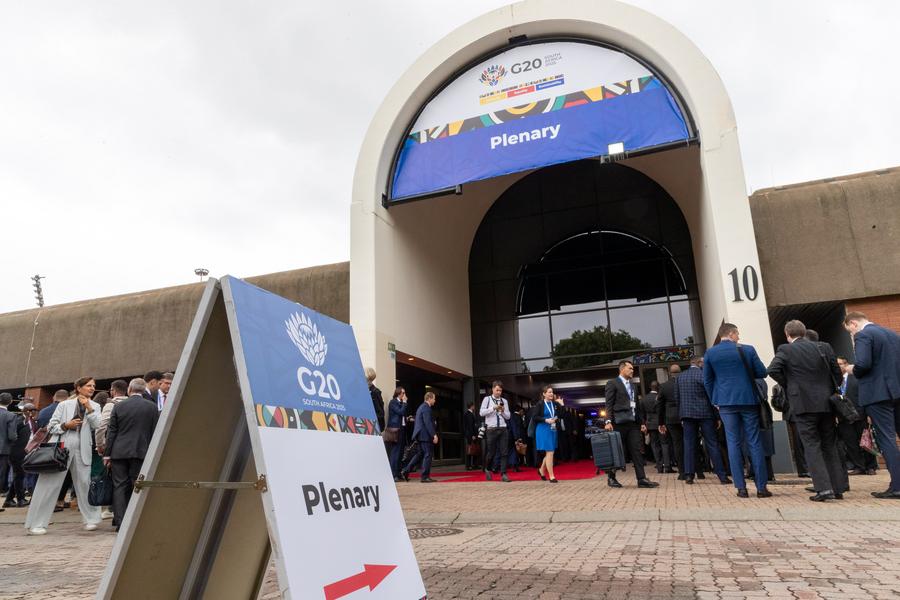Turning Vision Into Reality

We need to work with partners, and in this particular case, China is very important, because the areas of bilateral cooperation with China are very critical and actually aligned with Rwanda’s National Strategy for Transformation.
In a recent interview with ChinAfrica, Rwandan Ambassador to China James Kimonyo offered insightful perspectives on key national and global issues – from Rwanda’s development journey and its deepening partnership with China to the upcoming G20 Summit set to take place in South Africa later this year. Edited excerpts from the conversation follow.
ChinAfrica: Rwanda has impressed the world with its robust growth. It has set an ambitious goal to become a middle-income country by 2035 with a strong focus on economic transformation, innovation, and infrastructure development. What key strategies is Rwanda implementing to achieve this vision, and how significant is China’s role in supporting this transformation?
James Kimonyo: Right after the genocide, in 2000 Rwanda came up with a blueprint called Vision 2020, and in 2017, just three years away from completing Vision 2020, we came up with the National Strategy for Transformation (NST I), which was another roadmap for us to move our economy at the pace that we needed. Under that strategy, we had a number of programmes implemented under infrastructure, agriculture, urbanisation, technology and governance to make sure we move faster.
Then in 2024, the NST II was adopted, which is supposed to be completed by 2029. All these medium-term strategies are meant to transform Rwanda into a middle-income country by 2035 and a high-income country by 2050. Under that, you find a lot of programmes in cultural modernisation, job creation, infrastructure development, urbanisation, governance issues. All these programmes have sub-programmes under those major pillars.
We have some programmes that are implemented to make sure Rwanda achieves that medium-term goal and then long-term goals. We are happy to say that since last year, the economic growth rate went to 7.1 percent, and minus the COVID period, our country was able to grow at an average between 7–8 percent annually.
And I want to emphasise the fact that this cannot be done by the country alone. We need to work with partners, and in this particular case, China is very important, because the areas of bilateral cooperation with China are very critical and actually aligned with the NST II. We’re looking forward to continuing working with China and other nations to make sure we achieve that important objective.
This year marks the first time the G20 summit will be held in Africa. What do you think this will mean for Africa’s influence on the global stage? How can it help address pressing issues such as regional conflicts, food security, and climate change?
The history of injustices on the African continent has been based on the fact that Africa has been absent at the table where things are being decided and discussed. So, to be part of the G20 is a great opportunity for Africa to articulate its priorities and how the continent sees different issues that have to be addressed. If it is conflict, how do we, for instance, have G20 support African solutions to African problems, instead of waiting for prescriptions from the members of G20?

The African continent would want to work together with members of the G20 to address common challenges. Because when COVID happened, it had no border. This is a reminder for us that the African continent should be at the table to have a conversation on how to address common challenges. I think it’s a great opportunity. We’re looking forward to our leaders engaging with the fellow leaders in G20 to have honest, fair and transparent conversations on how we deal with the challenges that affect all of us.
With the return of President Trump, the US has been scaling back its support for Africa. What do you think the impact of this shift will be, and what can African countries do to mitigate any negative effects?
I think our president has always been outspoken on the issue of aid effectiveness. A decision to pull out of a programme or to support a programme is a sovereign decision that you make as a country. So, we don’t really want to question why the US decided to scale down their support for Africa.
What we are calling upon countries to do is to continue with the support to the African countries to support themselves. We encourage supporting the African countries to build the muscles to transform the economy. The danger of having this support that is endless precisely is that when it’s pulled out, you go into some kind of a shock. So, it’s a kind of a reminder.
Now, Rwanda has already invested in making vaccines and medical instruments. Because during COVID, we realised that our people were not protected at all, then we started immediately to invest in that. Even this scaling down is also a reminder that maybe there are things that we need to keep on the priority list in terms of domestic financing.
Amid rising protectionism in the West, China is expanding opening up. How do you evaluate the global implications of this, particularly for Africa? What role can the China-Africa relationship play in fostering global cooperation?
The global trading system should be such that all countries benefit, and transparency is very critical.
About the tariff issue, I would say that people should continue to have a conversation. The countries that are really highly involved in this, that are big players in international trade, must have a conversation to understand the impact of those tariffs. We are hoping that there’s going to be a conversation on how the issue of tariffs is going to be settled to make sure the global trading system and international trade are not adversely affected by the new policies that are being discussed. So, we are hoping that especially the powerful nations and big economies are going to look at the pros and cons of these tariffs.
 Facebook
Facebook
 Twitter
Twitter
 Linkedin
Linkedin
 Google +
Google +










